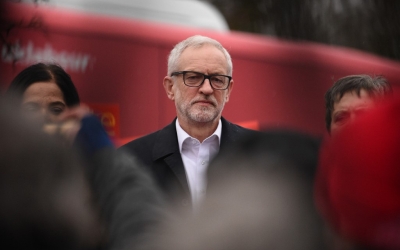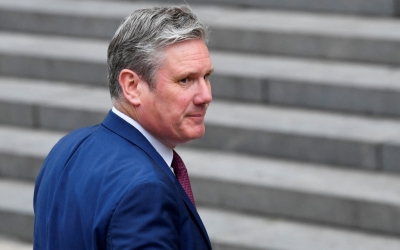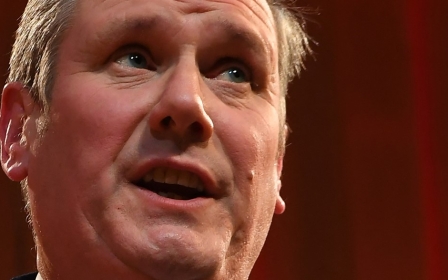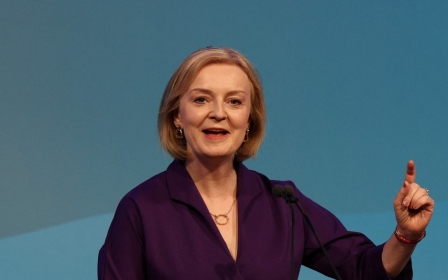Keir Starmer is finally ahead in the polls – but at what cost?
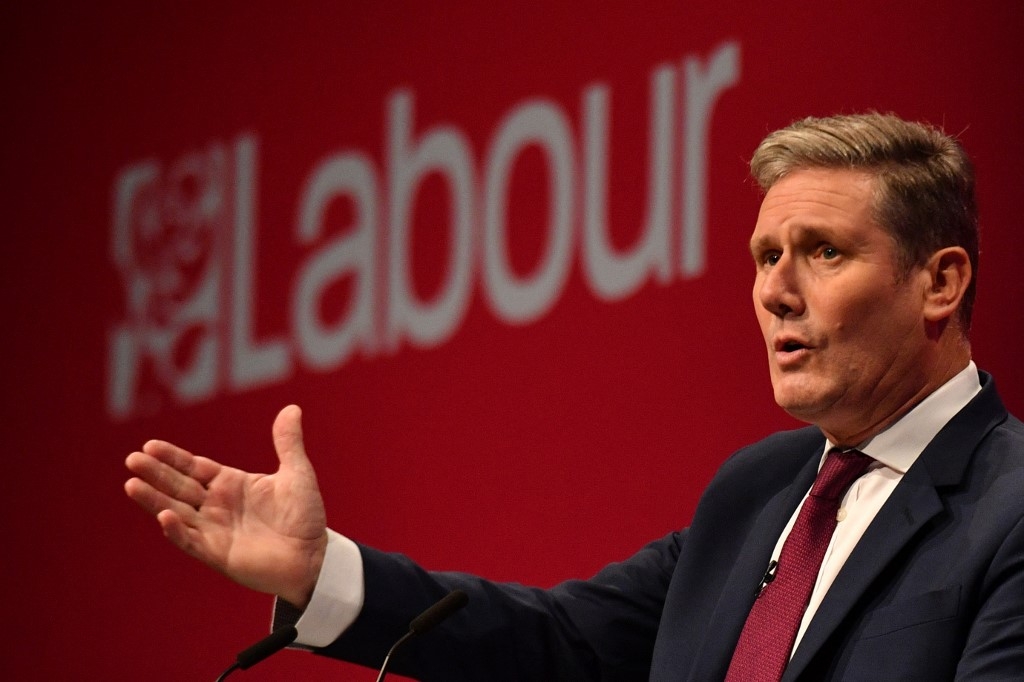
Keir Starmer’s wait-it-out approach may finally be beginning to pay dividends, two and a half years after he was elected Labour leader.
The head of the opposition has resolutely avoided offering any kind of vision for Britain, fearful it might be construed as vaguely socialist, and has even been averse to robustly challenging the ruling Tory party.
Instead, he has focused on reassuring voters - and the billionaire-owned media - that his party embodies the values associated with old-school conservatism: responsible belt-tightening, support for business, patriotism, law and order, the monarchy and militarism. Meanwhile, he has differentiated Labour simply by eschewing the more indefensible forms of predatory capitalism the current Conservative leadership embraces.
Starmer has differentiated Labour simply by eschewing the more indefensible forms of predatory capitalism the current Conservative leadership embraces
Starmer’s hope was that the public would eventually tire of the glaring cronyism and corruption of a ruling party that has been 12 years in power. Under the British system’s two-horse race, he reckoned he needed to do no more than position himself as the least bad option.
Voters, it seems, finally agree. After languishing stubbornly behind the government in surveys since his election to head Labour in early 2020, Starmer is now reported to have a seven-point lead over the Tories’ new leader, Liz Truss, when the public is asked who would do a better job as prime minister.
New MEE newsletter: Jerusalem Dispatch
Sign up to get the latest insights and analysis on Israel-Palestine, alongside Turkey Unpacked and other MEE newsletters
But it is circumstance - not a political programme - that has conspired to help Starmer. Which will be only too evident as he addresses Labour’s annual conference next week.
Deeply uncharismatic
Truss is hampered by being deeply uncharismatic - possibly even more so than Starmer, and in stark contrast to her immediate predecessor, Boris Johnson.
She has managed the difficult feat of appearing to be both opportunistic and a political ideologue for big business who lacks the popular touch. And she heads a Conservative Party barely able to conceal its disarray after such a long spell in government, just as Britain is about to lunge from an energy and cost-of-living crisis into full-blown recession.
To top it all, Truss’s government has vowed to let the energy sector continue raking in inflated profits rather than impose a crowd-pleasing windfall tax. Instead, she has frozen record high fuel bills, but it is taxpayers, not business, who will face the burden of repaying the £150bn ($170bn) costs further down the road.
And further underscoring how divorced she is from the public mood, Truss intends to reverse a planned rise in what is a historically low rate of corporation tax.
Given all of this, it would be simply astonishing if Starmer weren’t leading in the polls. Truss and her party have dealt him the easiest of hands, even if he continues to play it as cautiously as possible.
But Starmer’s success - assuming it can be maintained - has come at an extraordinarily high political price. Not least, he has shredded the pledges he made during his campaign for the Labour leadership, policy commitments he sold Labour members as evidence he would serve as the “continuity candidate” for his left-wing predecessor, Jeremy Corbyn.
In late June, he formally ditched those promises, saying Labour would be “starting from scratch”. That has included reneging on his commitment to take back into public ownership key utilities, including gas and electricity. He has blamed ballooning debt from the Covid-19 pandemic as the reason.
Saying “I’m not ideological”, Starmer told BBC Breakfast over the summer: “We’ve reversed those 2019 manifesto positions because we needed to show the country that we’re credible, we’re responsible on the economy.”
But his U-turn looks all the more foolhardy given the current energy crisis and the Tory government’s massive bailouts of suppliers.
Public discontent
In a similar vein, Starmer has strictly distanced Labour from the spate of strikes breaking out as workers struggle with escalating costs, despite earlier committing to “work shoulder to shoulder with the unions to stand up for working people, tackle insecure work and low pay… Oppose Tory attacks on the right to take industrial action and the weakening of workplace rights.”
While Starmer has agreed, when pressed, that workers have a “right” to strike in principle, his office has condemned strikes, like the rail union’s, when they actually take place. Back in June, his spokesperson said: “We’ve been clear in the position that the strikes shouldn’t go ahead. Nobody wants to see industrial action that is disruptive.”
Starmer has refused to cash in on the most visible sign of growing public discontent at Tory policies that continue to redistribute wealth upwards. The rail strikes are the biggest in decades.
He seems to have taken as his starting point an assumption - shared by the establishment media - that the antagonism engineered by the Thatcher government through the 1980s towards trade unions and industrial action still holds 40 years later. He has not dared to seize the initiative as workers’ pay falls well behind rocketing inflation.
It is a dramatic capitulation for a party in opposition that grew out of the activities of the trade union movement
He has banned Labour’s front bench from joining picket lines, an edict that has been defied by several of them and looked all the more risible as even barristers have begun taking industrial action.
It is a dramatic capitulation for a party in opposition that grew out of the activities of the trade union movement and still affirms on its website that its affiliation with leading unions “is what makes [Labour] unique”.
The appetite for a more radical approach to the Tory government has been highlighted by the rapid rise of Mick Lynch, leader of the striking Rail, Maritime and Transport Workers’ union (RMT). He has become the voice of a new populist grassroots politics filling the void on the left created by Starmer’s all-too visible absence.
For similar reasons, the Enough is Enough movement has recently emerged, demanding pay rises for workers and higher taxes for the rich. Enough is Enough unequivocally denounces a heartless establishment that, it implies, includes Starmer himself.
The prominent involvement of Labour MP Zarah Sultana, a Corbyn supporter, suggests the depth of frustration in growing sections of the party at the direction Starmer has taken.
Broken promises
The Labour leader’s raft of broken promises on key issues likely to be close to the hearts of voters as their living standards collapse risks casting him as unreliable and untrustworthy. But the problem runs deeper.
Starmer is determined to beat the Tories at their own game, vowing to “fight the election on economic growth”. In a speech in July he said “rebooting the economy” would be a Labour government’s “defining task”.
In practice, however, that appears to mean prioritising the supposed needs of the City and major corporations while paying only lip service to the struggle of ordinary people. Rather than proposing investment, as previous Labour leaders have done, he has preferred to turn the tables on the Tories, accusing them of relying on a “magic money tree”. Progressive politics is out in the cold.
Like the Tories, Starmer sees the economy in terms of a battle between the incompatible demands of employers - the state and big business - on one side, and workers on the other. But he has gone further, accepting neoliberal orthodoxy that concessions to workers hinder business and damage economic activity.
With such a worldview, he is beholden to the City, not ordinary people. Starmer’s Labour increasingly looks like a pale replica of the modern Conservative Party, which publicly extols the virtues of unfettered markets while privately skewing the economic battle-space in big business’s favour - a covert socialism, but for the rich only.
Left-wing party members who joined during Corbyn’s tenure have been fleeing in droves, depriving Labour of desperately needed income to fight the next general election. In recent months, trade unions have threatened to make further cuts to their funding, too.
Labour’s biggest donor, Unite, has reduced its contributions to fund grassroots initiatives Starmer’s Labour has abandoned. Its leader, Sharon Graham, has said of union funding for Labour: “I’m not sure we’re getting the best value for it.”
‘Catastrophic errors’
Starmer has sacked one shadow minister, Sam Tarry, the partner of Labour deputy leader Angela Rayner, after Tarry declared that “every worker should get a pay rise in line with inflation”. That view is backed by Labour’s left-wing Momentum faction, which is preparing a showdown with Starmer at the party conference.
In an interview with the New Statesman last month, Tarry offered a damning assessment of the Labour leader, accusing him of tearing the party apart to erase any trace of Corbynism, despite his predecessor taking the party in 2017 to within an inch of an election victory. Starmer, he said, was “making catastrophic errors, creating a punch-up with our own side”. He added: “Real grown-ups would actually get everyone back around the table, unite the party, pull the trade unions back on board, build up our war chest and then go on to win the general election.”
Starmer’s office had not responded before publication of this article to a request for comment from Middle East Eye.
Starmer’s reluctance to criticise Big Business or show solidarity with workers has shifted political ground in the UK even further to the right
Starmer’s reluctance to criticise big business or show solidarity with workers has shifted political ground in the UK even further to the right. Starmer has ensured that the two dominant parties in Britain, like those in the United States, are both unapologetically of capital.
Combined with his purges of the Labour left, including Corbyn, using antisemitism as the pretext, Starmer has hollowed out left-wing politics in the UK of any substance.
But worse, in colluding with the narrative of the Tories and establishment media, he has made a dirty word of socialism of any kind. Through his public positioning, he has legitimised the right’s discourse that left-wing politics is inherently subversive, unpatriotic and treasonous.
And in refusing to countenance any dissent from within Labour, or entertain any meaningful pluralism in its ranks - starkly illustrated by his approaches both to support for Nato and the monarchy - he has echoed not only the right’s agenda but its authoritarian instincts too.
Starmer may scrape a win at the next general election, against an internally divided Conservative governing party only too obviously divorced from the concerns of much of the electorate. But the signs are that there will be little enthusiasm for a Labour Party led by him as a replacement.
Starmer’s approach is inflicting further damage on a political system already seen by a majority of voters as a rigged game in which their interests are always ignored. As popular anger mounts, Starmer’s lack of vision for a sustainable future risks plunging parliamentary politics into even deeper crisis.
The views expressed in this article belong to the author and do not necessarily reflect the editorial policy of Middle East Eye.
Middle East Eye delivers independent and unrivalled coverage and analysis of the Middle East, North Africa and beyond. To learn more about republishing this content and the associated fees, please fill out this form. More about MEE can be found here.



